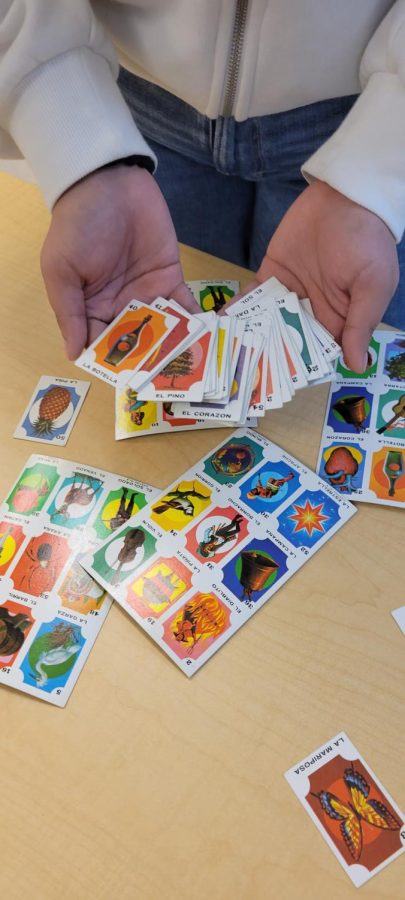Sedro-Woolley Celebrates a World of Tradition
December 15, 2022
Fuzzy socks, a gift exchange, and Santa Claus; for many, these are a staple of the holiday season. For some, however, the basics sound a bit more like a good plate of pozole, a game of Loteria, and a loud parranda. As winter break creeps around the corner for Sedro-Woolley High School, students look forward to all sorts of celebrations, and with each celebration comes many different traditions.
For most, music and games are the foundation of a party. For 11th grader Yeimy Larin, Cumbia is the way to go. “Around Christmas time we mainly listen and dance to Cumbia,” said Larin. Cumbia is a traditional genre and folk dance that originated in Colombia but has quickly spread across Latin America. Larin was born in El Salvador but grew up in Mexico – a switch that is visible in her traditions. For example, card games like Loteria and Barajas are traditionally played around Christmas in Mexico. “When it comes to games, the family and I mainly play Loteria.”
As fun as they may be, games are not always just played for entertainment. For sophomore An Dinh and their Vietnamese family, games carry a higher stake. “Instead of wrapped gifts, my culture usually has the aunts and uncles hand out money in the afternoon. We then ‘gamble’ — like playing a game to see whether we can get someone else’s money,” said Dinh. “These consist of seeing who can hit the other’s palm first, musical chairs, and the like.”
Even if some money is lost, Dinh likes to say, there is always dinner to look forward to. In fact, the Christmas menu is a long one. “We usually have Cha Lua (Vietnamese sausage), Jam Tet (candied fruits), Balut, Eggrolls, Banh Canh (a soup), Thit Kho (which is like braised pork with eggs), Xoi Gac (sweet rice), and seafood hot pot.”
Food is often only a perk of family gatherings, but for Puerto Rican 12th grader Alex Rodriguez, food is the center of the celebration. “Christmas in Puerto Rico is all about the food you eat. Even the songs are about food,” Rodriguez said. “We always have Arroz con gandules (rice with pigeon peas), pernil (roasted pork shoulder), and pasteles,” said Rodriguez. “Rice is most important. Without arroz con gandules there might as well be no celebration.”
The tradition of caroling may sound familiar, but for Rodriguez and her family, it becomes a bit more chaotic. “When we celebrate, we do something called parranda. We go to family members’ houses really early in the morning, we come with guitars, maracas, and güiro and we start singing very loudly. We sing aguinaldos, which are sort of like Puerto Rican Christmas carols.”
According to Gallup News, 71% of Americans consider Christmas to be a religious holiday. Senior Alexis Medina falls among them. “We are Catholic so our Christmas really incorporates that,” said Medina. “We listen mostly to Catholic music around the holidays.”
It is because Christmas is largely viewed as a religious holiday that Cultural Ambassador Zane Arangel intends to keep the school’s mode of celebration vague; not everyone celebrates religiously and some do not at all. “We talked about this in ASB: some people are jewish or celebrate Kwanzaa. We thought about ways we could try to recognize all of those types of people so everyone feels included,” said Arangel. “It’s the reason why our spirit days are sometimes Christmas themed and sometimes not. There are ones just like ‘wear your ski gear’ so we can allow people of other cultures to join in on the fun!”
For as unique as traditions can be, whether religious or not, most have one thing in common: family. “At the end of the day,” said Larin, “The most important part is that we are all together, is it not?”



